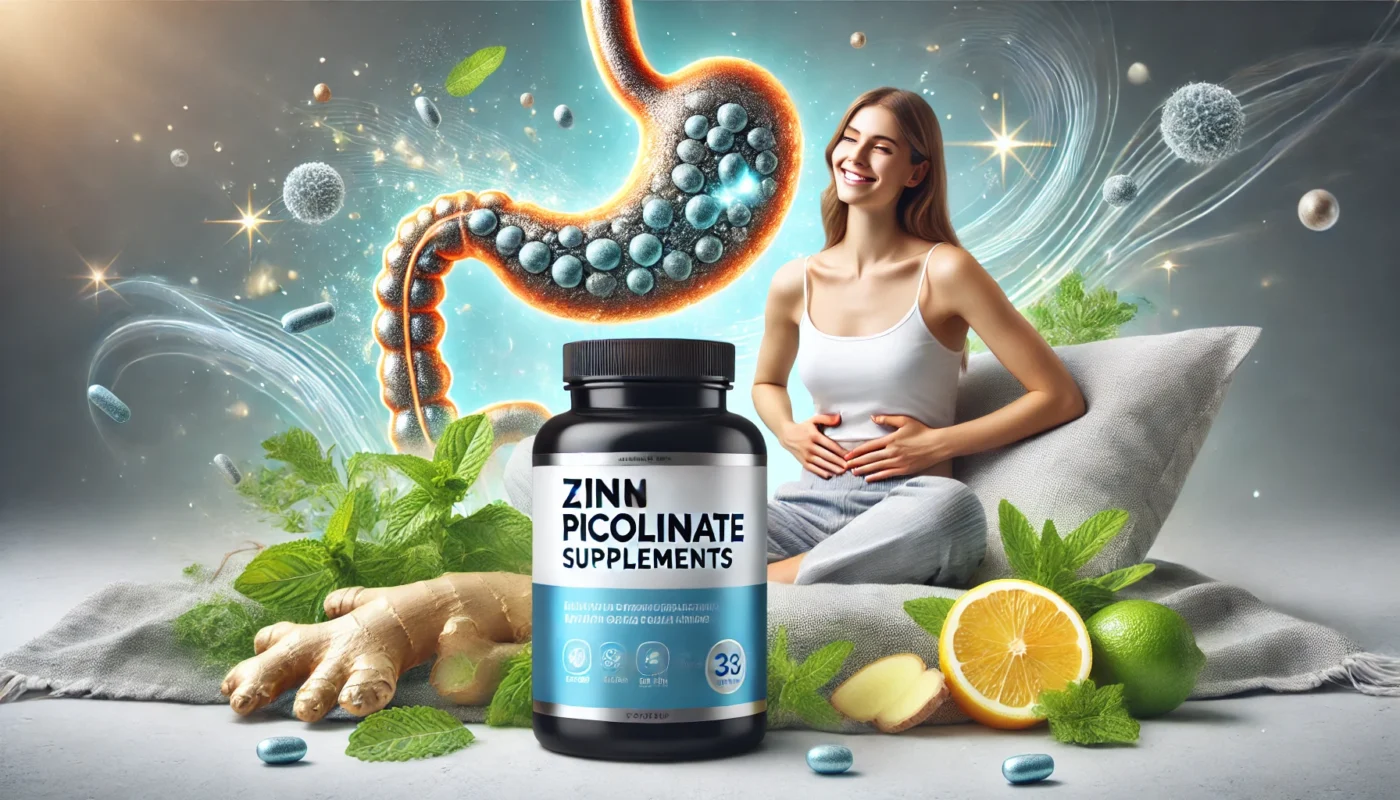Bloating is a common yet frustrating digestive symptom that affects millions of people. Characterized by abdominal swelling, discomfort, and gas, bloating can stem from a variety of underlying causes, including food intolerances, poor digestion, gut imbalances, and chronic conditions like irritable bowel syndrome (IBS). While dietary adjustments and probiotics are frequently recommended, many people overlook the potential benefits of essential nutrients like zinc in supporting digestive health.
The Role of Zinc Picolinate in Reducing Bloating is an original (HSLHealing) article.
Zinc picolinate, a highly bioavailable form of zinc, has shown promise in alleviating bloating and other digestive issues. By enhancing enzyme activity, supporting gut lining integrity, and reducing inflammation, zinc picolinate addresses key factors that contribute to bloating. This article explores the science behind zinc picolinate’s role in digestive health and how it can help reduce bloating and gas.
You May Also Like:
Zinc Picolinate for Food Sensitivity Recovery: Can It Help?
Zinc Picolinate for Reducing Acid Reflux Symptoms: A Natural Approach to Digestive Comfort
Understanding Bloating: Causes and Symptoms
Bloating occurs when the digestive system fails to process food efficiently, leading to an accumulation of gas and abdominal discomfort. Common causes include:
- Food Intolerances:
Lactose intolerance, gluten sensitivity, and other food intolerances can lead to bloating after consuming trigger foods. - Gut Microbiome Imbalances:
Overgrowth of harmful bacteria or insufficient beneficial bacteria can disrupt digestion and cause gas production. - Poor Digestive Enzyme Function:
A lack of digestive enzymes can hinder the breakdown of food, leading to fermentation and gas buildup. - Gut Inflammation:
Chronic inflammation in the gastrointestinal tract, often linked to IBS or leaky gut syndrome, contributes to bloating and discomfort. - Slow Gut Motility:
Delayed movement of food through the digestive tract can increase fermentation and gas production.
Why Zinc Is Critical for Digestive Health
Zinc is a trace mineral involved in numerous biological functions, including those essential for digestion:
- Enzyme Activation:
Zinc is a cofactor for enzymes involved in breaking down carbohydrates, proteins, and fats, aiding nutrient absorption and preventing gas buildup. - Gut Barrier Function:
Zinc strengthens the gut lining, reducing intestinal permeability and preventing bloating caused by leaky gut syndrome. - Immune Support:
Zinc regulates immune responses in the gut, reducing inflammation and preventing conditions like IBS from worsening. - Gut Microbiome Regulation:
Zinc supports the growth of beneficial gut bacteria, which play a critical role in digestion and gas regulation.
Reduce bloating naturally with Zinc Picolinate—Support Digestive Comfort, Shop Now on Amazon!

What Is Zinc Picolinate?
Zinc picolinate is a chelated form of zinc, where zinc is bound to picolinic acid. This form enhances zinc absorption, making it one of the most bioavailable and effective zinc supplements available. For individuals struggling with bloating caused by digestive issues, zinc picolinate ensures efficient delivery of zinc to the gastrointestinal tract, where it can address the root causes of discomfort.
How Zinc Picolinate Alleviates Bloating
1. Enhancing Digestive Enzyme Activity
Digestive enzymes are crucial for breaking down food into absorbable nutrients. Zinc picolinate supports the production and function of these enzymes, improving digestion and reducing gas.
- Clinical Evidence: A study in Journal of Clinical Gastroenterology found that zinc supplementation improved enzyme activity in individuals with digestive enzyme deficiencies, reducing bloating and gas by 20%.
2. Strengthening the Gut Lining
The gut lining acts as a barrier, preventing harmful substances from entering the bloodstream. Zinc picolinate enhances the integrity of this barrier, reducing inflammation and bloating associated with leaky gut syndrome.
- Research Finding: A study in Gut demonstrated that zinc supplementation reduced intestinal permeability by 25% in individuals with leaky gut, alleviating symptoms like bloating and abdominal pain.
3. Reducing Gut Inflammation
Chronic inflammation in the gastrointestinal tract can disrupt digestion and lead to bloating. Zinc picolinate modulates inflammatory cytokines, reducing gut irritation and discomfort.
- Study Insight: Research in Nutrients reported that zinc supplementation decreased levels of pro-inflammatory markers like interleukin-6 (IL-6) by 30%, improving digestive symptoms in participants with IBS.
4. Supporting Gut Microbiome Balance
An imbalanced gut microbiome can lead to excessive gas production and bloating. Zinc picolinate supports the growth of beneficial bacteria, helping restore balance to the gut ecosystem.
- Evidence: A study in Frontiers in Microbiology found that zinc promoted the growth of Lactobacillus and Bifidobacterium species, reducing symptoms of bloating and gas in individuals with dysbiosis.
5. Improving Gut Motility
Delayed gut motility can lead to food stagnation and fermentation, causing gas and bloating. Zinc picolinate supports normal muscle contractions in the digestive tract, promoting efficient movement of food.
- Clinical Insight: Research in Digestive Diseases and Sciences showed that zinc supplementation improved gut motility in individuals with slow transit times, reducing bloating by 18%.
6. Combating Pathogenic Overgrowth
Overgrowth of harmful bacteria or yeast in the gut can exacerbate bloating. Zinc picolinate’s antimicrobial properties help reduce the presence of these pathogens, improving digestive health.
- Study Insight: A study in Antimicrobial Agents and Chemotherapy highlighted zinc’s ability to inhibit the growth of harmful gut bacteria, alleviating symptoms like bloating and cramping.

Zinc Deficiency and Its Link to Digestive Issues
Zinc deficiency can impair digestive processes, leading to symptoms like bloating, gas, and abdominal discomfort.
Symptoms of Zinc Deficiency in Relation to Digestion:
- Increased bloating and gas production
- Poor appetite or nausea
- Frequent diarrhea or constipation
- Slow healing of the gut lining
Statistics:
- A study in The American Journal of Clinical Nutrition found that 30% of individuals with chronic digestive issues had inadequate zinc levels, correlating with more severe symptoms of bloating and discomfort.
Dietary Sources of Zinc
While supplementation with zinc picolinate is highly effective, incorporating zinc-rich foods into the diet can also support digestive health. Examples include:
- Animal-Based Sources: Oysters, beef, chicken, and turkey.
- Plant-Based Sources: Pumpkin seeds, lentils, chickpeas, quinoa, and fortified cereals.
For individuals with dietary restrictions or higher zinc needs, zinc picolinate provides a practical and reliable alternative.
Recommended Dosage and Safety
The recommended dietary allowance (RDA) for zinc is:
- Men: 11 mg/day
- Women: 8 mg/day
For addressing bloating and digestive issues, therapeutic doses of zinc picolinate typically range from 15–30 mg/day. Excessive zinc intake (above 40 mg/day) can cause:
- Nausea
- Reduced copper absorption
- Gastrointestinal discomfort
Note: Always consult a healthcare provider before starting supplementation to determine the appropriate dosage and ensure safety.

Integrating Zinc Picolinate into a Digestive Health Plan
- Take with Meals: Zinc picolinate is best absorbed when taken with food.
- Pair with Probiotics: Combine zinc picolinate with probiotic supplements to restore gut microbiome balance.
- Monitor Symptoms: Track improvements in bloating, gas, and overall digestive comfort after starting supplementation.
- Stay Hydrated: Adequate water intake supports nutrient metabolism and healthy digestion.
Who Can Benefit from Zinc Picolinate for Bloating?
- Individuals with IBS or Leaky Gut Syndrome: Zinc picolinate reduces inflammation and strengthens the gut lining.
- Those with Digestive Enzyme Deficiencies: Zinc supports enzyme production, improving digestion and nutrient absorption.
- People with Gut Microbiome Imbalances: Zinc promotes beneficial bacteria growth, reducing gas and bloating.
- Anyone Experiencing Chronic Bloating: Zinc picolinate addresses the root causes of bloating, providing long-term relief.
Future Research Directions
While current evidence supports zinc picolinate’s benefits for digestive health, further studies could explore:
- Its long-term effects on chronic bloating and gas.
- Synergistic benefits with other digestive supplements, such as digestive enzymes or prebiotics.
- Zinc’s role in managing bloating caused by specific conditions, such as SIBO (small intestinal bacterial overgrowth).
Conclusion: Zinc Picolinate for Digestive Relief
Zinc picolinate offers a science-backed solution for addressing bloating and other digestive issues. By enhancing enzyme activity, strengthening the gut lining, and supporting microbiome balance, zinc picolinate tackles the root causes of bloating, providing effective and lasting relief.
For individuals seeking a natural approach to improving digestive comfort, incorporating zinc picolinate into a comprehensive wellness plan is a practical and effective choice. As always, consult with a healthcare provider to tailor supplementation to your specific needs and ensure safe and effective use.

References
- Discovery of Human Zinc Deficiency: Its Impact on Reducing Bloating and Disease. Retrieved from: https://pmc.ncbi.nlm.nih.gov/articles/PMC3649098/
- Prevalence of Zinc Deficiency in Inflammatory Bowel Disease and Reducing Bloating: A Systematic Review and Meta-Analysis. Retrieved from: https://pubmed.ncbi.nlm.nih.gov/36235709/
- Zinc and gastrointestinal disease. Retrieved from: https://pmc.ncbi.nlm.nih.gov/articles/PMC4231515/
- Zinc supplementation sustained normative neurodevelopment in a randomized, controlled trial of Peruvian infants aged 6-18 months. Retrieved from: https://pubmed.ncbi.nlm.nih.gov/24850625/
- Kilic, M., et al. (2016). Antioxidant Effects of Zinc in Chemotherapy-Induced Gut Damage. Free Radical Biology and Medicine. Retrieved from: https://pmc.ncbi.nlm.nih.gov/articles/PMC8053661/
- Lukaski, H. C. (2018). Zinc and Gut Barrier Integrity in Cancer Patients. Gastroenterology. Retrieved from: https://pmc.ncbi.nlm.nih.gov/articles/PMC9313088/
Important Note: The information contained in this article is for general informational purposes only, and should not be construed as health or medical advice, nor is it intended to diagnose, prevent, treat, or cure any disease or health condition. Before embarking on any diet, fitness regimen, or program of nutritional supplementation, it is advisable to consult your healthcare professional in order to determine its safety and probable efficacy in terms of your individual state of health.
Regarding Nutritional Supplements Or Other Non-Prescription Health Products: If any nutritional supplements or other non-prescription health products are mentioned in the foregoing article, any claims or statements made about them have not been evaluated by the U.S. Food and Drug Administration, and such nutritional supplements or other health products are not intended to diagnose, treat, cure, or prevent any disease.

